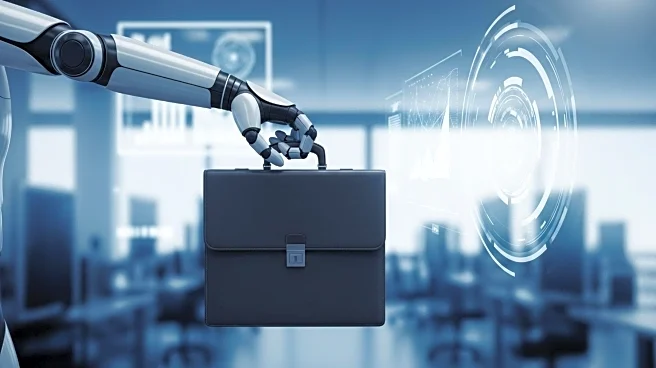What is the story about?
What's Happening?
Recent studies have highlighted the impact of artificial intelligence on the workforce, particularly affecting early-career workers in AI-exposed occupations. According to a report by Stanford University professors, these workers have experienced a 13% decline in employment. In contrast, employment for older workers and those in less-exposed fields has remained stable or increased. The decline is concentrated in occupations where AI is more likely to automate rather than augment human labor. Despite the turbulence caused by AI, experts suggest that economic uncertainty plays a larger role in the recent decline in job opportunities. Cory Stahle, a senior economist at Indeed, notes that AI's impact on the labor market is relatively small but not negligible. The Brookings Institute predicts that AI may augment rather than fully replace human workers, with a growing demand for AI skills.
Why It's Important?
The impact of AI on employment is significant as it reshapes the labor market, particularly affecting younger workers. This shift has implications for industries reliant on early-career employees, potentially leading to a skills gap if AI continues to automate roles traditionally filled by humans. The demand for AI skills suggests a shift towards augmentation rather than replacement, which could lead to retraining opportunities for workers. However, the economic uncertainty exacerbates the situation, causing businesses to be cautious in hiring decisions. This could lead to a conservative approach in workforce management, affecting job stability and growth in various sectors.
What's Next?
As AI continues to evolve, industries may need to adapt by investing in retraining programs to equip workers with necessary AI skills. Companies might focus on integrating AI technologies to enhance productivity while maintaining human roles. The broader economic climate will influence how quickly these changes occur, with potential policy interventions to support affected workers. Stakeholders, including businesses and policymakers, will need to address the balance between technological advancement and workforce stability.
Beyond the Headlines
The ethical implications of AI-driven employment changes are significant, raising questions about the responsibility of companies to support displaced workers. The cultural shift towards AI integration in the workplace may redefine job roles and expectations, influencing long-term career paths. As AI becomes more prevalent, the societal perception of technology's role in employment will evolve, potentially leading to new norms in job security and professional development.
















